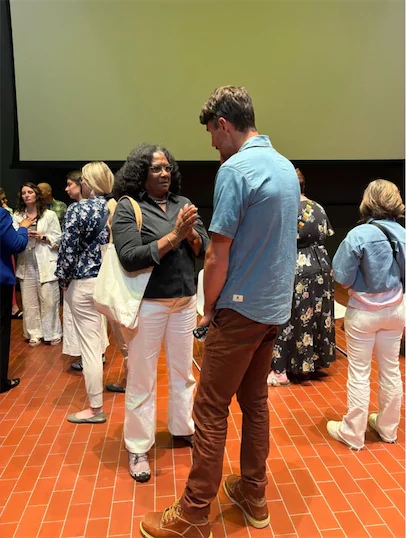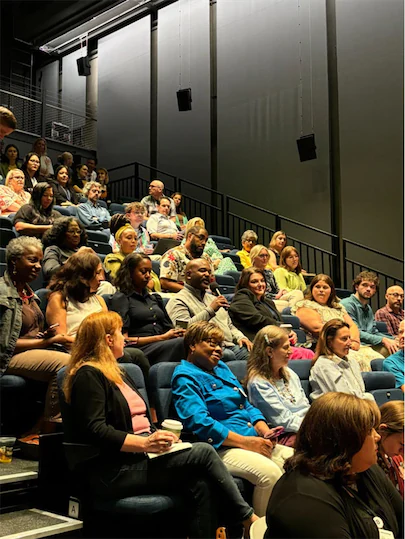
Powered by the NWA Council

Powered by the NWA Council
Bridging creates a space that is larger than the sum of its parts, honoring and affirming the multiple identities that individuals and groups bring to the table. It also values what can only come about when we extend who we are beyond our own identity group(s) and build something more expansive. This is the possibility of the collective that we want to spotlight in a strategic narrative for belonging.
– Olivia Araiza, Gerald Lenoir & Joshua Clark from UC Berkeley’s Othering & Belonging Institute
In early June, EngageNWA hosted a conversation with two remarkable individuals: Janie Mines, the first Black female graduate of the U.S. Naval Academy, and John-Rex Spivey, an officer of the Naval Reserve and a native of Rogers, Arkansas. The event was moderated by Monica Kumar and brought together over 70 community members from diverse backgrounds to discuss the power of inclusion and innovation.
Facilitating this conversation highlights a crucial part of EngageNWA’s work to ensure everyone feels a sense of belonging and connection, irrespective of their background or identity. By embracing a focus on belonging and bridging, EngageNWA aims to establish spaces where both newcomers and long-term residents alike feel a deep sense of ownership and connection to their community. True inclusion goes beyond mere representation; it necessitates actively creating environments where every individual feels valued, respected, and empowered to engage fully. This was exactly our hope with this conversation.
We dove right into the conversation by talking about Janie and John-Rex’s backgrounds, their mentorship relationship, advocacy, and power and change management. The audience had questions about military spending and community resistance when trying to build bridges.
One particular challenge highlighted was the idea that creating spaces where everyone belongs might require denying or sacrificing individual identities. Monica asked Janie and John-Rex where the connection of their mentor/mentee relationship sits in the work of inclusion and multi-racial solidarity, why it’s important as we move forward, and the kind of world we can build if we can continue to build on multi-racial solidarity:
Janie: Between the two of us, it wasn’t so much around multi-racial equity. It’s just two people that liked each other. We just had a lot in common. […] Neither one of us focused on what was different. We were more focused on us as individuals and the value we brought to one another’s lives. I think we get lost in all of that sometimes, and we just fail to remember that we are just all people. The same. We love our communities and our families. We all want the American dream. And in working together with a culture that says everybody deserves it, everybody should be part of it, then we don’t have to focus so much on making sure that this group or that group is taken care of because our foundational culture says this is here for everybody, and we maintain a society that makes it available for everybody. Disclaimer: If I say something that offends someone, it is not my intent. […] I love you. And we have to start there. Educate me, don’t get upset with me.
John-Rex: It’s simple. We are both simple. We just get to the point. One thing Janie and I talk about is how we became friends. We are not that different. You are an older Black woman, and I’m a younger white man. But if you move beyond those things on the surface and you actually get to our core values and what we have in common, we are more in common than different. We recognize our differences, but we focus on what we have in common to actually bring other people together.
Janie also brought the idea of echo chambers to the conversation, highlighting how people typically don’t step outside of their echo chambers where others see and experience the world in very similar ways. She emphasized that we have to step outside of our echo chambers if we want to understand why others feel the way they do. In attending the Naval Academy, she talked about having to step inside others’ echo chambers. She didn’t focus on the racism or the way others valued her because, she said, “When you turn your own personal evaluation over to somebody else, then you’ve turned your life over to them. We own our own value. We don’t allow other people to define that for us.”
This brings us to an important aspect of bridging, according to john a. powell from the Othering and Belonging Institute: “The solution to othering, as I oftentimes say, is not ‘saming’ but belonging.” Belonging refers to creating an environment where everyone feels accepted, respected, and valued for who they are, including their unique identities, backgrounds, and contributions.
Saming1, on the other hand, would imply trying to make everyone the same or ignoring differences altogether. This could mean expecting everyone to conform to a single standard or identity, which can undermine the richness that diversity brings to society.
When you focus on belonging rather than saming, it means that true inclusivity and belonging involve embracing and celebrating diversity rather than trying to make everyone uniform or ignoring the unique aspects of individuals and communities. It’s about fostering an environment where people can be themselves fully, with their differences acknowledged and respected. This approach enriches society by allowing for a wide range of perspectives, experiences, and talents to contribute positively to the community as a whole.
At EngageNWA, we are committed to creating spaces like the event with Janie and John-Rex where we can have dialogue with people who think differently than us. We recognize that there will be moments of disagreement and differing viewpoints, and that’s not just okay—it’s essential. This is where true bridging happens. By having conversations that challenge us and push us out of our comfort zones, we can foster environments where everyone feels a sense of belonging. Bridging does not mean sacrificing who you are or denying your identity. Instead, it is about increasing empathy, creating spaces for dialogue, and ensuring that every individual feels valued and respected.
This is our vision at EngageNWA: to cultivate spaces where meaningful conversations take place, where diversity is celebrated, and where every person, regardless of their background, can feel truly at home in our community. Let’s continue to build on this vision together, one conversation at a time.
1 john powell defines “saming” as the process or act of emphasizing sameness and minimizing differences between individuals or groups. This concept often occurs in social and cultural contexts where there is a tendency to highlight commonalities in order to create a sense of unity or to avoid conflict. Powell contrasts “saming” with “othering,” which focuses on highlighting and emphasizing differences, often leading to exclusion or marginalization of certain groups.
Editor’s Note: john a. powell prefers his name to be spelled in lowercase (“john a. powell”), as he believes it reflects the philosophy that we are “part of the universe, and not over it.” To learn more about john and his work, visit the john a. powell | Othering & Belonging Institute webpage.

